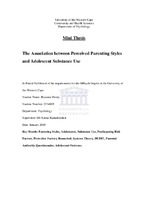| dc.description.abstract | Using the literature on Baumrind's theory of Parenting Styles and how perceptions of these are associated to adolescent at-risk behaviour, this study set out to examine whether any parenting style increased or decreased adolescent substance use. The central aim of this study was to examine the association between perceived parenting styles and adolescent substance use. To further this, 239 grade 10 and 11 adolescent participants were drawn from 3 schools in Mitchell's Plain, a suburb in the Western Cape (with permission granted from the Education Department). This particular suburb was chosen due to the high rates of substance use and substance related crime within the area. A quantitative research design was implemented within this study. The participants were required to complete the Drug Use Disorders Identification Test (DUDIT), a questionnaire aimed at measuring drug use, and the Parental Authority Questionnaire (PAQ), aimed at measuring perceived parenting styles and a Biographical Questionnaire to provide additional information. Informed consent was obtained and the confidentiality of the schools and participants were protected. Data analysis was conducted using SPSS, a data analysis programme available at the University of the Western Cape. Results show that substance use reduction was significantly related to a perceived authoritative parenting style. However, no significant relationships could be found between perceived permissive and authoritarian parenting style. Significant difference was found in the results obtained for male and female adolescents, with males generally appearing to use more substances. It can be concluded that perceived authoritative parenting styles have an important role to play in the prevention of adolescent substance abuse. | en_US |

